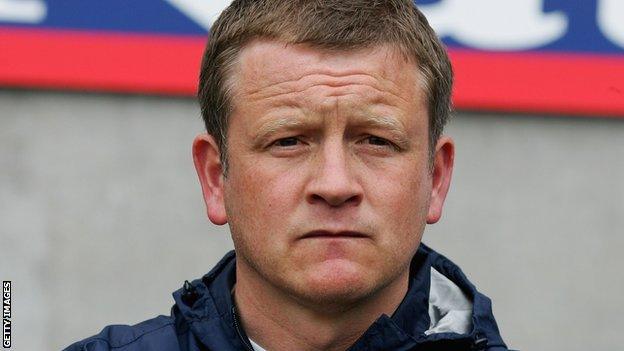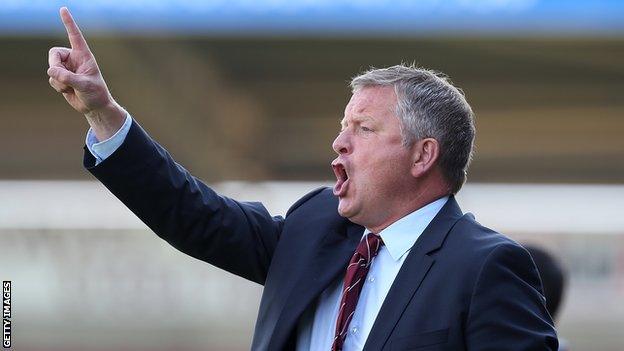Chris Wilder - the Sheff Utd boss as seen by those who played under him
- Published
- comments

Chris Wilder and Sheffield United won League One with 100 points in the 2016-17 season
Chris Wilder started out as a Sunday League manager and is now finding ways to outwit the best in the country on a regular basis.
It has been an eventful journey to reach this point, featuring five promotions at four different clubs, since taking his first job at Alfreton Town in 2001.
Wilder, who on Friday extended his Sheffield United contract to 2024, arrived at Alfreton as player-manager, leading the club to the Northern Counties East Premier Division title and success in the Derbyshire Senior Cup. He also had a lasting impact on the team's young prospect, Ryan France.
"Chris believed in me. He believed in what my strengths and abilities were. At the time I was a young lad playing in a men's team and he looked after me," says the winger, who went on to play in the Premier League with Hull City.
"He didn't let me off with anything. If I needed telling off, or I wasn't performing at 100% for whatever reason, he'd let me have it. I think sometimes you need that, especially as a young lad because you need to find that consistency in your game."
France had been released by Sheffield Wednesday at 16 and had started to doubt if he could make a career in football. He was 20, and busy earning a degree at Nottingham Trent University, when Wilder arrived. His new manager played behind him at right-back and provided plenty of support.
"He used to call me 'the future'," France says. "When he came into the team, all he used to do was pass me the ball. He believed in me. He came in and encouraged me to do the things I was good at. He became more than a manager; he became a close friend. We're still close friends now."
Although Wilder left Alfreton after a single season, with France ignoring interest from Coventry City to stay on for another year and complete his studies, he still took a keen interest in his former player's fortunes.
That much was shown when France did move on, to Hull in 2003.
"Before my debut against Kidderminster our secretary brought me a letter in," France says. "It was from Chris, wishing me all the best and saying he knew this day would come. He'd encouraged me to believe that it would happen."
France scored on his debut and never looked back. He'd reached the top level with Hull by 2008, just as Wilder's reign at his next club Halifax Town was coming to an end.
'He expected you to work hard - he didn't praise you for it'
When Wilder arrived at The Shay in July 2002, they had just been relegated out of the Football League. He was tasked with keeping the club competitive while cutting their wage bill.
Lewis Killeen, then a young prospect in Sheffield United's reserves, joined on loan in November that year. He later made the move permanent and stayed at Halifax for the duration of Wilder's six years in charge there, making more than 200 appearances.
"He made it his own squad," recalls Killeen. "He got in good professionals and good lads. People worked really hard, which is sort of his blueprint. That was one of the big things that stood out for me when I played for him.
"He expected you to work hard; he didn't praise you for it. I think that's done well for him throughout his career. You can see that with how his team's playing now.
"One of the main things that he used to say to us in the changing room was that he could put his dog on the pitch and it would work hard. He wanted that quality as well on top.
"Tactically he was very good at mixing it up. We'd play different ways in different games. Even though he had a preferred way of playing he'd change that if it wasn't working. The first year I was there we played 4-3-3 and not many teams were playing that sort of formation at that time."

Wilder spent six seasons in charge of Halifax Town
Halifax went on to challenge for promotion, reaching the play-off final in 2006, where they lost 3-2 to Hereford United, before the club went into decline. They successfully fought against relegation for two seasons, even overcoming a 10-point deduction for going into administration, but were eventually forced to fold.
The club was relaunched as FC Halifax Town but Wilder had already moved on to become Alan Knill's assistant manager at Bury, leaving after six months to take the Oxford United job in December 2008.
'The DVD analysis increased to a level I hadn't been used to'
Targeting a return to League Two, Oxford were struggling when Wilder came in.
"Training-wise the intensity increased and there was a lot more of an emphasis on winning. There were always games and there'd be races on a Friday," says James Constable, who was on loan from Shrewsbury Town at the time.
"Everybody wanted to win at everything they were doing and that little tweak in our mentality slowly soaked in. That's how we continued for the rest of the season. I think we only lost a couple of games for the remainder of the year. Unfortunately, we missed out on the play-offs because of a points deduction."
A peripheral figure at his parent club, Constable was signed permanently and became the focal point of the team, scoring 22 goals as Oxford went up through the play-offs. As they established themselves in League Two, Wilder's thoroughness and eye for detail increasingly stood out.
"The analysis with DVDs and clips increased to a level I hadn't been used to before. We were getting a pack on a match day of five or six pages with our set plays and their set plays. Things to think about. Their positives and negatives.
"On the Friday we'd get to see for ourselves what they did on set plays so going out there we'd covered every base. All the excuses were taken away and it was over to us to make sure we carried out what we'd worked on."
Wilder's stock was rising and, having already been linked with several vacancies, in January 2014 he took over at Northampton Town. It was a surprising move, with the Cobblers languishing bottom of League Two, but they clinched survival on the final day thanks to a 3-1 win over his former club.
'People were working hard and going three months without money'
The next season wasn't going to plan as Northampton hovered above the relegation zone but a few clever additions helped steer them to mid-table safety and lay the foundations for future success.
"We were in a bit of a tricky situation form-wise," says Joel Byrom, a midfielder who spend two years with Northampton from 2014.
"I think we dropped quite low in the league and a lot of people were calling for his head. Then all of a sudden he signed a couple of players in January who turned out to be really important for us over the next 18 months.
"Everyone mentions his recruitment. He knows the right people to have around the dressing room. There aren't cliques, or people thinking they're above their station. They're all good, honest lads. He had that at Northampton and I think he's got it again at Sheffield United."

Wilder won 61 of his 126 games in charge of Northampton
As with his previous roles, Wilder's man-management helped to create 'an unbelievable team spirit' that served the club well during difficult periods. A campaign which would end with 99 points and the League Two title started under a cloud, with financial uncertainty and staff not being paid.
"We played away at Notts County and after the game he was in a foul mood. We'd won the game but he spoke to the captain before his post-match interview and said, 'Look, I'm going to go in on the club a little bit.' He went mad. We had an offer from somebody who wanted to buy the club, the old chairman he'd been with at Oxford, and the club were stalling on it," recalls Byrom.
"He wanted the lads and the staff getting paid and we had a decent offer for a takeover. He was always pushing for the lads and had the best interests of the club at heart. People were working hard every day and they went up to three months without getting any money. He wanted the best for everyone."
Within a week of Wilder's outburst a deal was done and Northampton proceeded to dominate the division, losing just one of their last 26 league games. The celebrations had barely died down when an offer arrived from his boyhood club Sheffield United, which he simply couldn't refuse.
'He's ruthless - he has no qualms about dropping a player'
In the space of three years, supported by his long-time associate Alan Knill, Wilder led the Blades to two promotions and a place in the Premier League. Widely tipped to struggle, they have more than held their own without compromising on the clear identity and style of play that got them this far.
Jake Wright, who played for Wilder at Halifax, Oxford and then Sheffield United, has witnessed this impressive rise first-hand. A potent mix of hard work, tactical acumen, shrewd recruitment and an uncanny knack for inspiring players has been evident throughout.
"He's not changed at all," says the defender, now on loan at Bolton Wanderers.
"I don't think his training sessions or his intensity have changed. As he's progressed, he's got better players in, so the quality's changed. But how he goes about the day-to-day running of a football club hasn't really changed.
"He's always been hands-on. He's always taken a lot of sessions himself. He knows what it takes to win and he knows how to motivate his players to be ready for a game.
"He's ruthless. He's got no qualms about dropping a player - no matter how long you've know him or how well you've done for him - he makes decisions to benefit the club."
Like France, Killeen, Constable and Byrom, Wright is proud to have played for Wilder and felt his influence. No matter where they encountered him on his journey to the top, none are surprised to see him make it. They believe there's still more to come too.
"His CV's incredible - one of the best in the country for how well he's done at certain teams," Wright says.
"I can't compliment him enough as a manager. I've probably played more games for him than any other player and he hasn't changed the way he is. He's kept his philosophy.
"This is his dream job but if one of the top clubs came calling - no disrespect to Sheffield United - then it would be a difficult decision for him. I know he's very motivated and he wants to achieve as much as he can. I'm sure he'll have a lot of opportunities in the future."